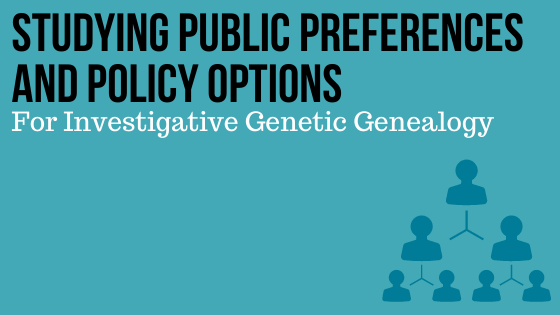Since the arrest of the Golden State Killer in April 2018, investigative genetic genealogy (IGG) has helped close hundreds of cases in the United States. But there are persistent concerns that this technique violates the privacy interests of participants in genetic genealogy databases and their families. Past studies have demonstrated that individuals are concerned about genetic privacy, yet they’re willing to share their genetic data to support activities that they believe are important, such as medical research. However, all of these studies pre-date IGG, and none explored the public’s attitudes towards law enforcement participation in genealogy databases.
written by: Christi J. Guerrini & Amy L. McGuire, Center for Medical Ethics and Health Policy at Baylor College of Medicine
In 2018, after the Golden State Killer arrest was announced, we conducted a survey in which we found strong public support in the United States for IGG when used in investigations of violent crimes. Looking to unpack that finding, in 2020, we obtained funding from the National Human Genome Research Institute to conduct a four-year study of public preferences related to IGG for the purpose of informing practice and policy. The research team’s other investigators include Dr. Stephanie (Malia) Fullerton of the University of Washington and Dr. John F.P. Bridges of The Ohio State University as co-investigators. CeCe Moore of Parabon NanoLabs serves as a project consultant.
The project comprises four integrated research activities (see figure). First, from February to August, 2021, we conducted in-depth interviews with 24 law enforcement and legal counsel, forensic scientists, genetic genealogy business representatives, and genetic genealogists to obtain a technically precise and comprehensive description of IGG practices and forecasts of its future. We are in the process of analyzing the data, and several preliminary trends have emerged: IGG expertise is being developed at all levels of law enforcement; the business of genetic genealogy is expanding; and norms and other mechanisms of self-regulation among those conducting IGG are emerging. We also heard about the influence of public opinion on IGG practices and concerns that misunderstanding of IGG (some of which we have written about) continues to be common. We will be reporting these and other findings in a paper soon.
We have also started preparing for focus groups that we will conduct around the United States to identify what the public believes are the most salient aspects of law enforcement participation in genetic genealogy databases. We will use information learned during focus groups to develop a survey that will be administered to 1,000 members of the general public to measure preferences relevant to IGG.
In the last stage of the study, we will conduct a modified policy Delphi with expert stakeholders to identify recommended practices for IGG. Developed by the RAND Corporation, the Delphi method is a process of group communication designed to facilitate technical forecasting by stakeholders. In a modified policy Delphi, the communications focus on policy issues and include obtaining input via iterative rounds of questionnaires and discussion. We will recruit diverse stakeholders to participate in this process and will include not only scientific, law enforcement, and genealogy experts but also ethicists, privacy scholars, and victims’ rights advocates. At the end of this process, we hope to identify guiding principles and consensus on some best practices for the conduct of IGG.
Despite its success at generating leads in hundreds of cases, there continues to be debate about the appropriate use and regulation of IGG. Oversight of this new technique must balance individual rights and interests with public safety and the pursuit of justice. We strongly believe that policies should be empirically informed, based on an in-depth understanding of current practice and future possibilities and with input from multiple stakeholders, including, critically, those in the investigative trenches. This project is a first step in generating empirical data to help inform future policy development.
WOULD YOU LIKE TO SEE MORE ARTICLES LIKE THIS? SUBSCRIBE TO THE ISHI BLOG BELOW!
SUBSCRIBE NOW!



